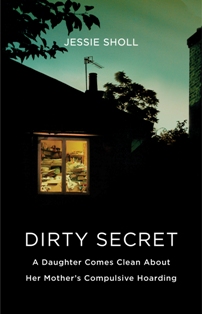
 Once only the shameful and "dirty secret" of the title, compulsive hoarding has recently entered the public consciousness through such reality shows as Hoarders and Hoarding: Buried Alive. Though hoarding is estimated to afflict as many as seven million Americans, it remains a mysterious and difficult to treat mental illness, wreaking havoc on families, posing severe health risks to those who suffer from it and causing untold anguish. In her sometimes funny but mostly heartbreaking memoir, Jessie Sholl recounts her life as the daughter of a compulsive hoarder; in telling her painful story, she sheds light on aspects of the illness that TV cameras miss.
Once only the shameful and "dirty secret" of the title, compulsive hoarding has recently entered the public consciousness through such reality shows as Hoarders and Hoarding: Buried Alive. Though hoarding is estimated to afflict as many as seven million Americans, it remains a mysterious and difficult to treat mental illness, wreaking havoc on families, posing severe health risks to those who suffer from it and causing untold anguish. In her sometimes funny but mostly heartbreaking memoir, Jessie Sholl recounts her life as the daughter of a compulsive hoarder; in telling her painful story, she sheds light on aspects of the illness that TV cameras miss.
When her mother was recently diagnosed with colon cancer, Jessie flew to Minneapolis from her home in New York to help out. What this meant--in practical terms--was attempting to clean up her mother's hellishly hoarded home (the same house she'd escaped decades earlier). As she wades through the junk, papers, refuse, empty shopping bags and countless duplicates of things like sneakers, toasters and bottles of hand lotion, Jessie is forced to relive the most difficult aspects of her childhood. By her own account, Jessie's parents were a terrible match from the start, divorcing when she was very young and forcing her to become her unstable mother's caretaker. The signs of mental illness were there from the start--deep depressions, neglect of Jessie and her younger brother, casual and inexplicable cruelty (Jessie's mother tortured her repeatedly by reinforcing her fear of snakes with a pathological glee) and, of course, the hoarding--an escalating nightmare that Jessie was unable to control. Even moving in with her gentle father and understanding stepmother couldn't help Jessie overcome the shame, stigma and anxiety associated with being her mother's daughter.
Hoarding seems to have an easy fix--just clean it up and throw it all away--but Jessie demonstrates how impossible that is. Hoarding, as she points out, has elements of OCD, but also affects areas of the brain associated with planning, decision-making and emotional expression. While specific stressors may aggravate the condition, the hoarder is unlikely to understand that there is anything wrong with his/her behavior and is therefore highly resistant to changing it.
Using gallows humor borne out of years of frustration, Jessie soldiers on in her quest to help her mother, ultimately realizing (after, among other things, contracting a horrific case of drug-resistant scabies in her mother's house) that there is a limit to what she is able to accomplish and that caring for herself is the only way for her to attain happiness in her own life.--Debra Ginsberg
Shelf Talker: This is a disturbing and painful account of growing up in the shadow of compulsive hoarding, but it is very well written and highly compelling; a story that will doubtless resonate with many readers.

